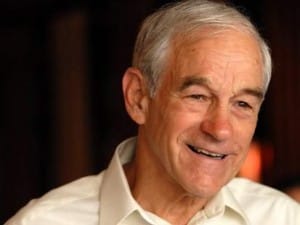Ron Paul's base could disrupt the media's sloppy political narrative


As the mainstream media delivered yet another dose of the silent treatment to Congressman Ron Paul at this weekend's CBS/National Journal presidential debate, there's an approach that could be embraced by his loyal supporters looking to disrupt the media's definition of a "presidential" candidate.
Paul's followers know full well that the media establishment's marginalization of him is all too real. The Pew Research Center's Project for Excellence in Journalism recently confirmed what many of his followers had already suspected: Paul received the least amount of news coverage of any of the current Republican presidential candidates, ranking dead last despite placing third in numerous polls and winning many state straw polls as well.
Limiting the independent-minded Texas Congressman has been a pattern in the series of recent debates and appeared to reach a boiling point this weekend. With Congressman Paul being allowed to explain why he's qualified to be president in only 258 words in the entire hour long debate, National Campaign Chairman Jesse Benton unloaded on CBS by calling the network's treatment of Ron Paul "disgraceful, especially given that tonight's debate centered on foreign policy and national security."
"Congressman Paul was only allocated 90 seconds of speaking in one televised hour. If we are to have an authentic national conversation on issues such as security and defense, we can and must do better to ensure that all voices are heard," Benton said.
Ironically, the network's treatment of Paul in this latest foreign policy debate comes as he's recently been shown to raise the most cash from military workers out of the current Republican field. The network's shunning of Paul also took place as he placed third in a CNN/ORC poll released on Monday.
However, there are two ways Paul supporters could respond to the mainstream media. For one, they could continue to hammer away at an establishment media that's repeatedly demonstrated an unwillingness to surrender control of shaping the current political narrative. Or, which I would posit as a more effective alternative, Paul's supporters could leverage the vast success that he's had on the internet in order to continue mobilizing a forceful, grassroots-driven movement.
Paul's base is well-known for being active online. This mobilization could take a specific approach other than logging on to social networks to slam media coverage of the outsider candidate right after a televised debate. With media bias being nothing new under the sun, this isn't what the disgruntled and frustrated electorate at large is seeking at this moment.
Exhausted from constant political gridlock, the public as a whole is looking for specific solutions that will put this country back on track. For this reason, it might be more effective if Paul's supporters leveraged the net to defend those very ideas which make him a politician of substance. By using logic and reason to demonstrate why they believe Paul's ideas are the best, a people-powered movement could become viral on his behalf. Taking for granted the monopoly that they've had on political discourse for many years, the mainstream media has never faced a challenge like the enthusiastic and primarily internet-driven movement of Paul's.
Texas Governor Rick Perry and Herman Cain-both of whom the media have more aggressively hyped up- have faltered as of late. Currently being touted by the media, former Speaker of the House Newt Gingrich has yet to prove himself as a non-establishment candidate. And the Republican base appears to be uneasy at the thought of Mitt Romney as the Republican nominee.
These converging factors on the right make Paul's meteoric rise a distinct possibility. But again, it may largely depend on his followers putting out more persuasive, positive, and solution-based content via the net.



